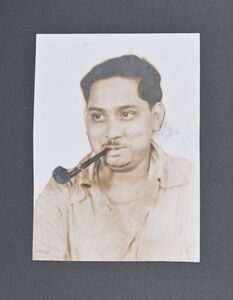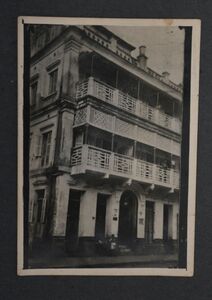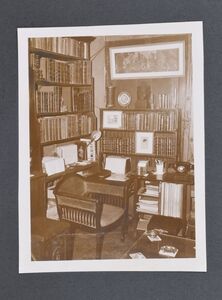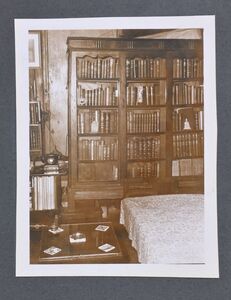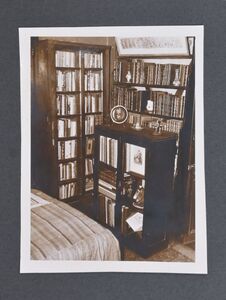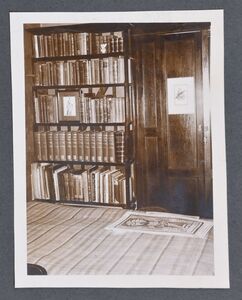A well-known historian, looking for a rare book on Tibet, got in touch with antiquarians, she knew. The quest began in Calcutta and ended in an obscure corner of Ireland. The Kumars are proud to have succeeded in the mission. It brings not only money but a lot of thrill too.
Stepping inside the rectangular room at 79/23. Lower Circular Road, what produces an immediate impact on a visitor is the remarkable variety of things, ranging from books to joss-stick holders, all sharing one thing in common — antiquity. You can almost inhale the past. This is the Kumars' antiquarian book-selling concern. "The room was grandiose once", recalled a local newspaper in its obituary of the firm's first proprietor, Nirmal Kumar. Today the room is also used as sleeping quarters.
"Ours is a dying profession", Mr Kumar once told his son sadly. "Too much of cheap commercialism has come into it." A few days later he died of heart failure and his son, Aloke Kumar, then in his early twenties took charge of the business. He regrets that he cannot keep prices down as his father had done. "We are here to value art but can't really love it", Aloke Kumar paused to stress the paradox. "If you love something, you don't wish to part with it". He rummaged through a pile of folios; then softly pulled out two lithographs of birds nearly falling apart. "My father, even though pestered by buyers, did not have the heart to part with them." Then followed lithoprints by Daniel, Heber, Turner and Greenlay, all of whom, it seemed were fascinated by the typical Indian scene. Next Chinese wood-block prints. Then the prize exhibit, a bound manuscript: A commentary on the Quran. "Priceless." whispered Kumar, caressing the cover with his palm.
The Kumars are the only Indian concern affiliated to the Antiquarian Booksellers Association in London whose agents are scattered all over the world. Most of them are descendants of British residents in India in the colonial days. "I've not met any of them. We negotiate through letters. There is this woman in Italy. I've fallen in love with her name — Maria". To save freight charges, over-seas transactions are at times made through friendly tourists. Only a month ago, Kumar had met a pleasant young Englishman. "My agent had asked him to deliver a few books to me. Now he is one of my agents". The Kumars usually choose their books with the help of catalogues of renowned sellers like Frank Hammonds and Bernard Quaritch. "The catalogues themselves at times, become as valuable as a rare book". But Aloke Kumar has to rely mainly on the demands of his buyers. "My. father", he said, "actually began with his own library." Book-selling was not their hereditary profession. It seems strange to this young antiquarian that his forefathers transported slaves from the rural areas to the tea gardens of Assam. "Father was the first to think of a different way to make money".
Overseas transactions have to be curtailed to meet the domestic demand. "Of course, a little bit of partiality is involved here", Kumar confessed. "We like the precious to stay at home." This is why, notwithstanding foreign demands, his father sold a rare historical document "Reis and Rayot" to a local buyer. "We are a clan", said Nirmal Kumar once, "operating in a very close circle, the sellers always conscious of the buyers' preferences."
The paradox is that any excessive rise in the price of books puts the trade in jeopardy. The number of clients decline. "Father was too fussy about keeping down prices," Kumar sighed. " There were times when he nearly starved. But he spent lavishly what he earn-ed." Though rather inexperienced In the field, Aloke Kumar feels a subconscious urge to live up to professional standards. "That's what comes from sniffing old pages from birth. I don't know how. but just have to look at a picture of the Buddha to know whether it's a `Maithu Mrigayaa' or not. I have a sort of sixth sense about shapes and colours .... We had to skip over books to cross the room when we were kids".
Rare Originals
Reprints of rare books in Delhi and Varanasi have given book-lovers an unexpected opportunity. A reprint of "The Hindu Temple" by Stella Kramrish. (the original worth Rs 1.200) costs Rs 250. Of course. Kumar's buyers prefer the originals. "Take. for example, an elephant folio litilograph by Daniel. Ybb can't reprint that, can you? One of them has been sold by Southebys for Rs 1 lakh!"
Aloke Kumar has come across all kinds of people—from a brigadier to a clerk at the Telephone Ex-change—"all crazy about books." "There was a bird-watcher who always forgot what he wanted to say. A Norwegian seaman. whenever in Calcutta. used to spend hours here". Aloke Kumar's latest friend is a Tibetan monk.
Aloke Kumar is having to think of a part-time job to ensure 'a comparatively secure life. It is a one-man business and he finds himself too inexperienced to cope. "Father held it all in his brain. He could even picture his buyer's library without going there". Talking of other antiquarians Kumar said, "A whimsical lot, you know". His father was not at all religious, and yet he never let non-vegetarian food go anywhere near his books. Just below a photograph of his father, still smiling with a pipe between his lips, Aloke Kumar sat pondering over his uncertain future. The setting sun threw a yellow hue on the wall and the books looked graver.


